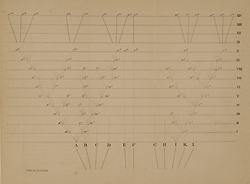The World That Darwin Made
A Modern Biology

A branching tree of life, in Charles Darwin, On the origin of species, 1859
Two words barely touched the text of the Origin of Species, “creation” and “evolution,” and both are in the same concluding passage of the book:
There is grandeur in this view of life, with its several powers, having been originally breathed by the Creator into a few forms or into one; and that, whilst this planet has gone circling on according to the fixed law of gravity, from so simple a beginning endless forms most beautiful and most wonderful have been, and are being evolved. [The words “by the Creator” are absent from the first edition, but present in the second edition of 1860, and subsequent.]
Their presence showed the fine line that Darwin walked. For lack of better knowledge, Darwin ascribed the origin of life to a creator, though his use of the word was just a cipher for his ignorance—he was concerned with the origin of species, not life. But he was also shy of using the word “evolution” too freely. For in his time, evolution commonly meant the pre-ordained working out of an implicit plan, as in the evolution of a fertilized cell to embryo and then to organism. This type of evolution both revealed what was already present implicitly, and unrolled progressively, moving towards a better, more complete state.
Darwin’s claims were both more radical and more modest. He was concerned with the origins of new species by natural means, but didn’t maintain that these new species were necessarily “better” than the old ones—rather, very particularly, they just matched the conditions of life more successfully than those which had come before. At a stroke, Darwin had proposed both that the cosmos put up truly new things, and that it was not going in any particular direction—that “new” was not “better.” His evocation of life in all its complexity, from the last paragraph of the Origin, captured that sense of beauty in fecundity, without judgment of superiority:
It is interesting to contemplate a tangled bank, clothed with many plants of many kinds, with birds singing on the bushes, with various insects flitting about, and with worms crawling through the damp earth, and to reflect that these elaborately constructed forms, so different from each other, and dependent upon each other in so complex a manner, have all been produced by laws acting around us.
Last Reviewed: May 7, 2014


